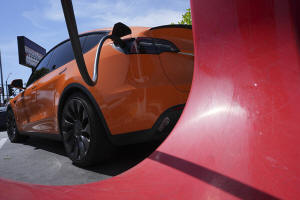Senate votes to block California’s rule banning the sale of new
gas-powered cars by 2035
[May 23, 2025]
By MARY CLARE JALONICK and SOPHIE AUSTIN
WASHINGTON (AP) — The Senate voted on Thursday to block California’s
first-in-the nation rule banning the sale of new gas-powered cars by
2035, moving to kill the country's most aggressive effort to transition
toward electric vehicles as President Donald Trump’s administration has
doubled down on fossil fuels.
The measure overturning the rule now goes to the White House, where
Trump is expected to sign it, along with two other resolutions that
would block California rules curbing tailpipe emissions in certain
vehicles and smog-forming nitrogen oxide pollution from trucks. All
three measures were approved by the Senate on Thursday and by the House
earlier this month.
California Gov. Gavin Newsom, a Democrat, and state air regulators say
that what Congress is doing is illegal and they will sue to keep the
rules in place.
“This is not about electric vehicles,” Newsom said at a news conference
while the Senate was still voting on the measures. “This is about
polluters being able to pollute more.”
California Attorney General Rob Bonta said the state plans to sue over
the way that Republicans passed the measures blocking the emissions
rules. Senate Republicans established a narrow exception to the
filibuster Wednesday to clear the way for the votes.
The GOP effort could have a profound impact on California’s longtime
efforts to curb air pollution. California makes up roughly 11% of the
U.S. car market, giving it significant power to shape purchasing trends
— especially because about a dozen states have already followed
California's lead. Vehicles are one of the largest sources of
planet-warming emissions.

Senate Democrats charged that Republicans are acting at the behest of
the oil and gas industry and they say California should be able to set
its own standards after obtaining waivers from the Environmental
Protection Agency.
Sen. Adam Schiff, D-Calif., said the votes should “send a chill down the
spine of legislators in every state."
“What we have at stake is a state’s ability, it’s right to make its own
laws and to protect its own citizens, without having this body overturn
that right,” Schiff said.
Republicans say the phaseout of gas-powered cars, along with other
waivers that California has obtained from the EPA, is costly for
consumers and manufacturers, puts pressure on the nation’s energy grid
and has become a de facto nationwide electric vehicle mandate.
“America cannot meet these impossible standards –- not next year, and
not in 10 years,” said Wyoming Sen. John Barrasso, the second-ranking
Republican.
Newsom announced plans in 2020 to ban the sale of all new gas-powered
vehicles within 15 years as part of an aggressive effort to lower
emissions from the transportation sector. Plug-in hybrids and used gas
cars could still be sold.
[to top of second column]
|

An electric vehicle is seen charging at a charging station Thursday,
May 22, 2025, in Long Beach, Calif. (AP Photo/Damian Dovarganes)

The Biden administration approved the state’s waiver to implement
the standards in December, a month before Trump returned to office.
The California rules are stricter than a Biden-era rule that
tightens emissions standards but does not require sales of electric
vehicles.
Biden’s EPA said in announcing the decision that opponents of the
California waivers did not meet their legal burden to show how
either the EV rule or a separate measure on heavy-duty vehicles was
inconsistent with the Clean Air Act.
Republicans have long criticized California's waivers and have
worked to find a way to overturn them. The Government Accountability
Office said earlier this year that California’s policies are not
subject to the Congressional Review Act, a law that allows Congress
to reject federal regulations under certain circumstances with a
simple majority vote not subject to the filibuster. The Senate
parliamentarian agreed with that ruling, but Senate Majority Leader
John Thune, R-S.D., cleared the way for the votes anyway with a
workaround that established a new Senate precedent.
Democrats fought those changes, which were the latest attempt to
chip away at the Senate filibuster after both parties have used
their majorities in the past two decades to lower the threshold for
nominations. Democrats tried in 2022 to roll back the filibuster for
legislation, as well, but were thwarted by members of their own
caucus who disagreed with the effort.
Republicans have insisted that they would not try a similar move
after regaining the majority this year. But Senate Democratic leader
Chuck Schumer of New York said the move to block California’s laws
were a “point of no return” and called the Republicans “fair weather
institutionalists.”
Sen. Elissa Slotkin of Michigan was the only Democrat to support the
measure to block the phaseout of gas-powered vehicles. She said in a
statement after the vote that she has a “special responsibility to
stand up for the more than one million Michiganders whose
livelihoods depend on the U.S. auto industry.”

John Bozzella, president and CEO of the Alliance for Automotive
Innovation, an auto industry association and lobby group, said there
is a gap between the vehicles that car buyers are purchasing and the
rules that would force a transition to electric vehicles.
“The fact is these EV sales mandates were never achievable,"
Bozzella said.
___
Austin reported from Sacramento. Associated Press writers Alexa St.
John in Detroit and Matthew Daly contributed to this report.
All contents © copyright 2025 Associated Press. All rights reserved |